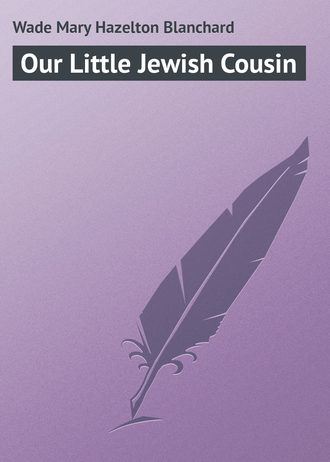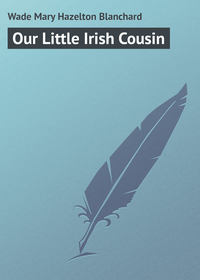 полная версия
полная версияOur Little Jewish Cousin
"Of course we do," said both children.
"Very well, then. It is about the visit of the Queen of Sheba with her generals and armies. As she approached, the great king received her sitting on his throne in that wondrous palace of which you have heard so much.
"'Is he as wise as people say?' the queen said to her attendants. 'I will find this out for myself.'
"Now it happened that her subjects were noted for their skill in making artificial flowers. Those who made it their business to study flowers could not tell the difference between real ones and these imitation ones, they were so perfect.
"The queen decided to test King Solomon's wisdom in this matter. She ordered two beautiful wreaths to be prepared. One was to be made of real flowers and the other of artificial ones. Taking the two wreaths in her hands, she presented herself before the king.
"'Choose one of these for yourself,' she said.
"There seemed to be no choice as to which he would take, although he looked at them closely. But his wise mind told him there must be some difference. The birds and insects could tell him which one to take. He looked out of a window and saw honey-bees in the garden below. Then he knew what to do. He ordered the window to be opened. The breeze carried the odour of the flowers out to the bees and they came flying into the room.
"You can easily guess they alighted on the wreath of real flowers. The artificial ones did not attract them in the least. Then Solomon spoke.
"'The bees have told me which wreath to choose,' he said."
"The Queen of Sheba found out that the king was truly wise, didn't she?" said Solomon.
"Yes, Solomon, and you who are named for him should always remember what the Queen of Sheba learned, – that there is one thing worth more than riches or beauty."
"And that is wisdom," said Rebecca, softly.
CHAPTER III
THE FEAST OF THE PASSOVER
It was the first evening of the seven days set apart to celebrate the deliverance of the Jews from their bondage in Egypt and their safe passage to a new home of their own.
Solomon and Esther were dressed in their Sabbath clothes. So were their father and mother. The house was trimmed as though for a wedding.
"Is the table ready?" Esther's mother asked the servant.
"Quite ready. Everything is in its place, I think," was the answer.
The children's father led the way, and the family gathered around the table. There were lettuce and cress, unleavened bread, wine, and a meat bone which was carefully covered with a fine cloth.
Solomon and his father began to chant. They rocked themselves to and fro at the same time. This motion of their bodies was to express as well as possible the words of the psalm, "All my bones shall praise thee."
When the chant was finished, the master of the house cut a slice from a loaf of bread shaped like a crescent.
"These two pieces of bread," he said, solemnly, "are like the shores of the Red Sea. But now, as I join them together again, it seems as though we could see the waves sweeping over Pharaoh's host."
He then took one-half the loaf and, putting it in a napkin, tied it on Solomon's shoulders. There it remained till the ceremony was over. Everybody drank some wine, and then another chant was sung. After that, they ate some lettuce and jam and chanted again.
Esther's father now took some bread, spread it with jam, wrapped it in lettuce and wound cress around it. He gave some of it to each one to eat. This was done in memory of the ten plagues of Egypt.
The service was not finished until every one had eaten eggs. This was a sign of mourning that their temple had been destroyed.
Solomon and Esther understood the meaning of all that was done this evening. They had been carefully taught the history of the "Chosen People," as they liked to call themselves. But at this festival their father once more repeated many of the stories of the olden time.
He said, "We do not celebrate this festival exactly as our forefathers did. They always sacrificed a lamb. They were also careful to eat no leavened food for the whole seven days. We follow the rule about unleavened bread still, and we look upon the first and last days as holy. You must never do labour of any kind on these two days."
Then he went on to tell the story of the first Passover, and how Pharaoh, as the ruler of Egypt was called, wished to keep the Hebrews in bondage. He was building two treasure-cities, and he needed great numbers of workmen to make the bricks. He did not wish the Hebrews to join his enemies or leave the country.
He was a stern ruler, and he made his slaves work very hard. Yet they had many children. The Pharaoh did not like this. He feared they would become too powerful. So he ordered that every new-born boy among them should be killed.
It happened at this time that a little boy was born in a family where there were already two children. This new baby was a boy, and was given the name of Moses. The mother of the child was fearful lest he should be discovered and killed by the cruel Pharaoh. She hid him as best she could for three months. Then she thought: "The danger grows greater every day. I must make some new plan to save him."
She placed the baby in a little cradle or ark, and carried him down to the shore of the river, where she hid him in the reeds. She told her daughter Miriam to stay near her brother and watch over him. Then she went away.
A little while after this, who should come but the noble princess, Pharaoh's daughter. She was going to bathe in the river. It was not long before she spied the smiling baby in the bulrushes. She was so pleased with the little fellow that she said, "I will adopt the child."
Then the little Miriam came to her side and told the princess she knew of a good nurse. In this way it came about that Moses' own mother was hired to take care of the baby.
As he grew up in the king's palace, his mother told Moses all about himself and his people. He was very carefully taught, and soon showed that he was "mighty in words and deeds."
It happened one day that Moses saw one of the overseers cruelly beating an Israelite. He was so angry that he killed the overseer. Then he had to flee to save his own life from the wrath of Pharaoh. He went into the desert not far from the Red Sea, and there he stayed for forty years.
He became a shepherd. Once while he was tending his sheep, he saw a strange sight. It was a burning bush. That in itself was nothing to wonder at. But the strange part of it all was that the bush looked as though it were in flames, yet it did not really burn up. It was a sign from Heaven!
As Moses looked at the bush, he heard a voice. It cried, "Take off your shoes, for you are standing on holy ground."
He listened in wonder as he next received a command from God to seek the ruler of Egypt, who was now treating the people of Israel with great cruelty. He must give the Pharaoh a message. It was this, – that God commanded Moses to lead the people of Israel out of Egypt and into the desert.
At first Moses feared to do this. But the Lord caused some miracles to be performed before his eyes. Then he had faith, and became brave enough to do as God commanded him.
He went with his brother Aaron to the ruler of Egypt. He told him that he had received word from Heaven ordering him to lead the people of Israel out into the desert to take part in a feast.
The cruel Pharaoh did not believe in God. He was angry with Moses and refused to let the people go.
Moses now showed the power the Lord had given him. He lifted his rod and commanded ten plagues to come down on the land of Egypt. This was to punish the Pharaoh and force him to free the Israelites.
One by one the plagues fell upon the country. The waters were changed to blood, and great numbers of frogs appeared upon the land. Besides these creatures, there were swarms of lice, flies, and other pests.
The people of Egypt became sick. The land was covered with darkness. The Pharaoh was frightened and promised to let the Israelites leave his country. Then the darkness lifted and the plagues ceased. But as soon as this happened, the Pharaoh broke his promise.
The troubles began again. Pharaoh made fresh promises, only to break them again as soon as the plagues stopped.
At last, God sent an angel into Egypt to kill all the first-born of the people. The Israelites, however, were not to be harmed. Moses told them to smear their door-posts with the blood of a lamb.
The angel moved from house to house, doing as the Lord had directed. But when he came to a door-post marked with the blood of a lamb, he passed it by, and no one within was harmed.
Esther's father told the story that evening, as though the children had never heard it before. Yet they had listened to it every year since they could remember.
The blood of a lamb! Yes, the people in olden time had good reason to sacrifice a lamb at the Passover.
It was well named the Passover, in memory of the angel's passing over the homes of the Chosen People.
CHAPTER IV
THE ORPHAN
"Dear me! How my head aches," said Esther. "I do wish those dogs would stop barking."
The little girl had been ill for two or three days. The hot days of summer had brought on a fever. The doctor had said, "Keep the child quiet. All she needs is rest. She has played too much in the sunshine."
But how could poor little Esther have quiet? The street dogs were noisy enough in the daytime, but when night came, it seemed as though every single one was wide awake and quarrelling with his neighbours.
"They have no home, and are almost obliged to fight, to get enough to eat. I am sorry for them," said Esther's mother.
She felt more kindly to the dogs than most of the people in Jerusalem. They would have been glad to have the city rid of the creatures.
These street dogs look very much like foxes. They have no homes of their own and almost no friends. Those living in one part of the city are always ready to carry on war against those of every other part.
"Let us take Esther up on the roof," said the little girl's father, one evening. "It is such a hot night, she cannot rest in this close room."
Esther felt better almost as soon as she had been carried up and settled on a soft couch. The roof of the stone house where she lived was flat. Most of the houses around her were built in the same way. Many of the neighbours spent their evenings on the roofs, and often moved from one roof to another to make calls on each other.
Esther had been up there only a few minutes before she had a caller. It was a little girl about her own age. She told Esther some news about one of their playmates. She said:
"Only think of it! Miriam's father has just died. You know, Esther, her mother died so long ago that she doesn't even remember her. What will become of her now? There is no one in the world to take care of her."
Esther was very fond of Miriam, and her heart was full of pity.
She thought of her own comfortable home and then of the many Jews in the city who were very, very poor. Perhaps Miriam would become a beggar! It was a dreadful thought.
Just then Esther's mother came up on the roof. She was dressed in a beautiful yellow robe. A rich girdle belted it in at the waist. She wore large golden hoops in her ears, and a heavy chain around her neck.
"Mamma is as lovely as a queen," thought Esther. "I know papa isn't rich. Still, he has enough and to spare, and we have many nice things. I will ask him and mamma to adopt Miriam. Then I shall have a sister of my own.
"Mamma, dear, I have just heard about Miriam, and now I want to ask you something. Will you take her for your little daughter?"
The mother sat down beside the sick girl. Her face wore a gentle smile.
"My dear, I am glad the thought came to you. You are a sweet, loving child. Do you know, your father and I have just been talking about this very thing. There is nothing our Church praises more highly than the adoption of an orphan. It is called 'A good work.' So we have decided to add one more to our little family."
Esther clapped her hands with joy. "I know I shall get well at once," she cried. "The fever will go away, for I sha'n't have time to think of it."
It was just as she had said. It seemed as though she began to get better from that very moment. She had so much to do trying to entertain her new sister, she did not think of herself.
Miriam was sad at first. She could not help remembering she was an orphan. But her new father and mother were so kind to her, and Solomon and his sister tried so hard to make her happy, she soon forgot to be lonesome and sad.
One day a message came from Rebecca and Levi. They wished all the children to come and visit them. Rebecca wrote:
"We have a new pet, and I know you will be fond of it. It is a beautiful Syrian sheep. Its wool is a soft brown and yellow. Its tail is very broad and flat. It is so tame, it follows me wherever I go.
"Besides," the letter went on, "we have quantities of fresh figs now, and I know you children are very fond of them."
"May we go, mother? Please say 'yes,'" asked Esther.
"If your father is willing," was the answer. "I shall be very lonesome, but it will do you all good to leave the city for awhile and visit our kind friends."
That evening, Esther and Miriam ran to meet their father.
"I wish father had a little farm," said Esther, as the two girls walked arm in arm down the street. "I should think it would be ever so much easier than being a trader."
"I spoke about that once to my other father," said thoughtful little Miriam. "He said that in the good old times our people were generally shepherds or farmers. But nowadays they are almost all traders.
"It is because those who do not believe as we do have treated us so cruelly. They have made it hard for us to hold land. We have been forced to become traders. Our people are scattered all over the world. Father said there is hardly a country without some of them."
"Let us ask papa to tell us stories of old times to-night," said Esther. "There, I see his scarlet robe away down the street now."
CHAPTER V
THE JEWS OF LONG AGO
"May we go to Levi's, papa dear?" asked Esther, when the evening meal was over and the children were gathered with their parents on the housetop. "Mamma said she was willing, but we must ask you."
"I think it would be very pleasant for you, and I know Levi and Rebecca like to have you there. Yes, you may go."
"I knew you would say yes. And now we want to ask you something else. Will you tell us some stories of long ago, before our city was destroyed?"
"I suppose you would like best to hear about the children, Esther?"
"Of course, papa."
"They were very happy. Their parents were as wise and tender in caring for them as they are to-day.
"When they were yet quite young, they began to study the books of wisdom of our people. They went to school every day. There was one saying they heard over and over again. It was this, 'Be not forgetful to entertain strangers.'
"'Our houses are not for us alone,' their parents said, and taught them this beautiful saying, 'Let thy house be wide open, and let the poor be the children of the house.'
"There were many pilgrim feasts in those days. People came to Jerusalem to worship in the temple and to take part in the sacred festivals. Yet it is said that not one of these pilgrims ever felt the need of entertainment. The houses were open for all.
"Only think of it! It was a common thing to walk along the street and see curtains hanging in front of the doors. This was a sign that there was still room for guests. Some people went so far as to say, 'There should be four doors to every house. Then travellers could be welcomed from every direction.'"
"What kind of houses did the people live in?" asked Solomon.
"There were small cottages where the poor lived, for there were some, of course, who did not have much of this world's goods. Then there were the houses of the middle class. These were built of brick or stone. And besides these there were the elegant marble homes of the rich, built around beautiful courtyards.
"The houses had flat roofs paved with stone or brick. They were made to slant down a little, so as to let the rain-water run off through pipes into the cistern below. These cisterns were needed in the old days just as much as now, on account of the long months when no rain fell and the country became so dry.
"A railing was built around each housetop. In this way it was made into a comfortable resting-place for the family and their friends. It was cool and quiet."
"We follow the same fashion," said Esther.
"Yes, but in the old times I suppose it was used even more than now. The older people often went up there to pray. Meetings were sometimes held there. It was also a good place to watch for the enemy.
"The rich people often had wide and costly stairs built up to the roof from the street. You can imagine the boys and girls running over these stairs in a game of chase or hide-and-seek."
"How did the people of two thousand years ago furnish their houses?" asked Miriam.
"Very much as we do now. They had couches, chairs and tables, and there were often many soft cushions for the head and arms. The people used candlesticks and lamps, exactly as we do.
"But I promised to talk most about the children. They took part with their parents in family prayer every night and morning. They washed and prayed before every meal. After it, they gave thanks to God for his kindness to them. As each Sabbath came around, the children looked forward to it as though they were going to welcome a king. It was a time of rest and joy.
"When the father came home on the eve of the holy day, he found the house trimmed up as though for a feast. The Sabbath lamp was lighted. The table was spread with the richest feast the family could afford. Before doing anything else, the father blessed each child with the blessing of Israel. The little ones felt that something beautiful and holy was about to take place.
"They were quite willing to give up their play for the next day. They would have something better."
"You have taught us all these things, papa," said Esther.
"I know it, my dear. But I tell them again so that you may see we have not changed much since the old days.
"The children looked forward to the feast-days with joyful delight. It is hard to say which they liked best."
"They must have loved the Feast of the Dedication," said Miriam.
"Why, Miriam?"
"On account of the many candles. It is so pleasant to watch a great number of them burning at once."
"Yes, children always love lights and brightness. The first evening of the feast, a candle was lighted for each one in the house. The second evening, two were lighted, and so on to the eighth night."
"But the Feast of Esther brings more sport," said Solomon.
"You are just like every other boy, Solomon. You like noise and fun," said his father.
"But, think a moment, children. Must not the Feast of the Passover have been the greatest one of all?"
"It was then that the father repeated the whole history of the Children of Israel to his listening children. They loved to hear it. It seemed to them as though they were really following the Chosen People in their wanderings. They looked upon Moses receiving the commandments from Heaven. As they shut their eyes, they saw in their minds the waters of the Red Sea parting to let the Children of Israel pass across in safety. Then, again coming together, the waves closed over their enemies and destroyed them."
"Father, you tell us the stories as well as any one possibly could," said Solomon.
"I do my best, Solomon. But in the olden days the children were brought nearer to heaven by their visits to the temple.
"Think of that glorious building and its walls shining with gold! It seems as though I could see the throng of white-robed priests and hear the blasts they sounded on their silver trumpets.
"Listen! A chant from the Psalms rings through the great building. It sounds like heavenly voices." Esther's father closed his eyes and became silent. The children were filled with awe as they sat quietly beside him.
"I wish I could have lived in the long ago," thought Esther. "The temple must have seemed like a part of heaven brought to earth."
"Now we will repeat the night prayer and go to rest," said the father.
CHAPTER VI
QUEER SIGHTS
"Would you like to go shopping with me?" said Esther's mother, the next afternoon. "I must buy some things you children will need to carry with you on your visit."
Esther and Miriam jumped up from their play. They were always ready to go shopping. They liked to see the pretty things in the shops.
Esther's mother had made herself ready for her walk by fastening a bright red shawl over her head. She never wore a hat or a bonnet, as do her American sisters.
"We will go to the market first," she told the children. "I wish to buy some fruit."
It was quite a long walk, but there was so much to see on the way, Esther and Miriam did not think of that.
"Do see that drove of donkeys," exclaimed their mother, after they had entered one of the principal streets. "They are laden with goatskins filled with water, I suppose. Listen, children! Their Arab driver is calling to them."
"O-ar! o-ar! derak! derak!" sounded the driver's voice.
A small boy running down a byway mimicked the Arab.
"O-ar! o-ar! derak! derak!"
"See that solemn old camel," said Esther. "He is laden with stones. They must be very heavy. Poor old fellow! I don't blame him for growling at his master for trying to hurry him up."
"His growl rattles so, it seems to come from his inmost stomach," said the mother, laughingly.
"Baksheesh! baksheesh!" yelled a beggar sitting cross-legged against the wall of a house. The man was ragged and dirty. He held a tin pail before him. Kind-hearted people had dropped money, fruit, and vegetables into it as they passed by.
"There are many poor people of our own faith here in the city," said Esther's mother, as they went on their way. "They really suffer for lack of food. That man is a Turk. It may be that he is really as poor as he looks, and needs all the help he can get. But it is quite possible he has a comfortable home, and only begs because it is an easy way of getting a living."
"Look, mamma, at that woman of Bethlehem," said Miriam. "I know her by the dress."
Miriam pointed to the dark blue robe. Stripes of bright red, mixed with gold, reached down the sides. The sleeves were large and long, and trimmed in the same way. The woman's white veil hung down from a tall cap.
"How heavy her cap must be," said Esther. "It is like a crown."
"All the coins she owns are sewed on her cap," answered the mother. "It tells every one just how rich she is."
"I don't see how she does her work if she wears that robe all the time," said Miriam. "The sleeves are so large, I should think they must be in the way."
"She probably ties them together behind her. I have been told that is the way. She can use them as pockets."
"I don't see how men ever get used to carrying such big loads," said Esther.
She pointed to two porters who were bent nearly double. Their loads were strapped upon cushions fastened on their backs, and held in place by straps around their heads.
"Each of those men must have almost as much of a load as a camel carries," said Esther's mother. "It seems almost impossible, but it is true. It is a hard life, a very hard life."
While she was speaking they entered the market. The eyes of the little girls were kept busy looking at the many different things of interest.
There were Arabs in charge of camels laden with melons, grapes and figs. There were women selling vegetables, and at the same time taking care of their babies. There were patient donkeys longing to be freed from their loads of goods which their masters were trying to sell.
"Mamma, mamma!" whispered Esther. "There is a baby gazelle in the basket on that woman's head. It is even smaller than the one I saw at Rebecca's. I suppose she is trying to sell the little thing."
"Look at the woman beside her," said Miriam. "She looks very tired. I suppose she has walked several miles from her own village with her baskets of fruit. Her baby boy sits on her shoulders, crowing and laughing at every one who passes by."









